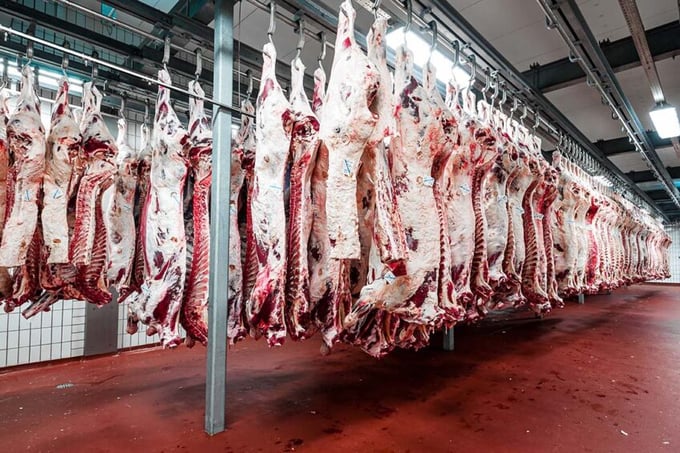November 25, 2025 | 00:32 GMT +7
November 25, 2025 | 00:32 GMT +7
Hotline: 0913.378.918
November 25, 2025 | 00:32 GMT +7
Hotline: 0913.378.918

Photo: Canva
For the full year of 2023, the pork production was 927,400 tonnes, the lowest annual volume recorded since 2018.
Carcass weights, averaging at 89.1kg, were lower throughout 2023, compared to 2022 when the long backlog in pig slaughter due to a number of reasons resulted in elevated weights.
In December, the UK produced 71,900 tonnes of pork, a decline of 18% compared to the last month of 2022. Clean pig slaughtering fell by 17% to 781,800 animals, representing a loss of over 177,000 head from December 2022, despite reported efforts to pull pigs forwards ahead of Christmas, the National Pig Association (NPA) said.
The December slaughter deficit contrasted with much smaller year-on-year declines for November (910,000) and October (887,000) of 5% and 10% respectively. “Adverse wet weather conditions caused flooding and wider disruption during the month and may have had an impact on throughputs,” said senior analyst Freya Shuttleworth at the Agriculture and Horticulture Development Board (AHDB).
The UK Department for Environment, Forestry and Rural Affairs (Defra) earlier reported that the overall pig population in the UK declined by more than 10% between June 2022 and the same month last year. The number of finishers in June 2023 was down by 11.2% to 4.26 million head, the lowest number recorded since 2015, reflecting 2022’s UK breeding herd contraction on the back of the 2-year industry crisis and the impacts on fertility of the summer 2022 heatwave, the NPA says.
In November, the UK had to import 71,300 tonnes of pork, up 1,200 tonnes compared to the previous month. In the months August until November, UK pig meat imports were constantly higher than in the month before. For the 1st 11 eleven months of 2023, imports were still 2% lower at 720,000 tonnes. Multiple factors are contributing to the increase in import volumes, and lower production in the domestic market remains central, AHDB said earlier.
(PP)

(VAN) Brazil's COP30 presidency pushed through a compromise climate deal on Saturday that would boost finance for poor nations coping with global warming but that omitted any mention of the fossil fuels driving it.

(VAN) Poultry farmers in the UK have been warned that they could face one of the worst winters yet for bird flu.

(VAN) Prices of main-crop paddy have risen sharply, with jasmine rice hitting 16,100 baht per tonne — the highest level in years.

(VAN) In Brazil, FAO unveiled a series of reports and initiatives showing how sustainable agrifood systems are a solution to the climate crisis.

(VAN) With names like neodymium and dysprosium, rare-earth elements sound exotic — and their perceived scarcity has only added to the mystique.

(VAN) In a new study published in Trends in Biotechnology, researchers used a gene-editing technology called CRISPR to increase a fungus's production efficiency and cut its production-related environmental impact by as much as 61%- all without adding any foreign DNA.

(VAN) A top official in Beijing’s Cop delegation says China is committed to clean energy – but US’s absence is a problem.